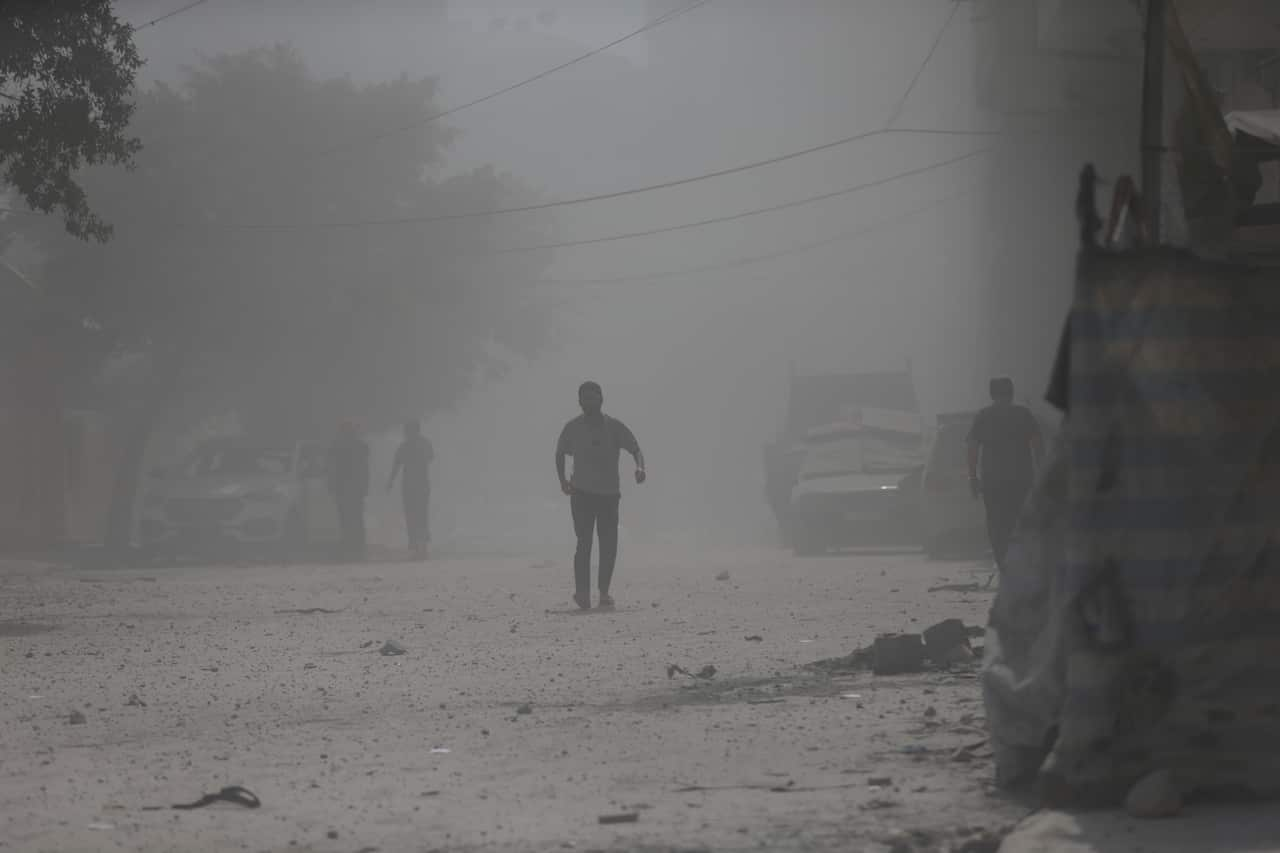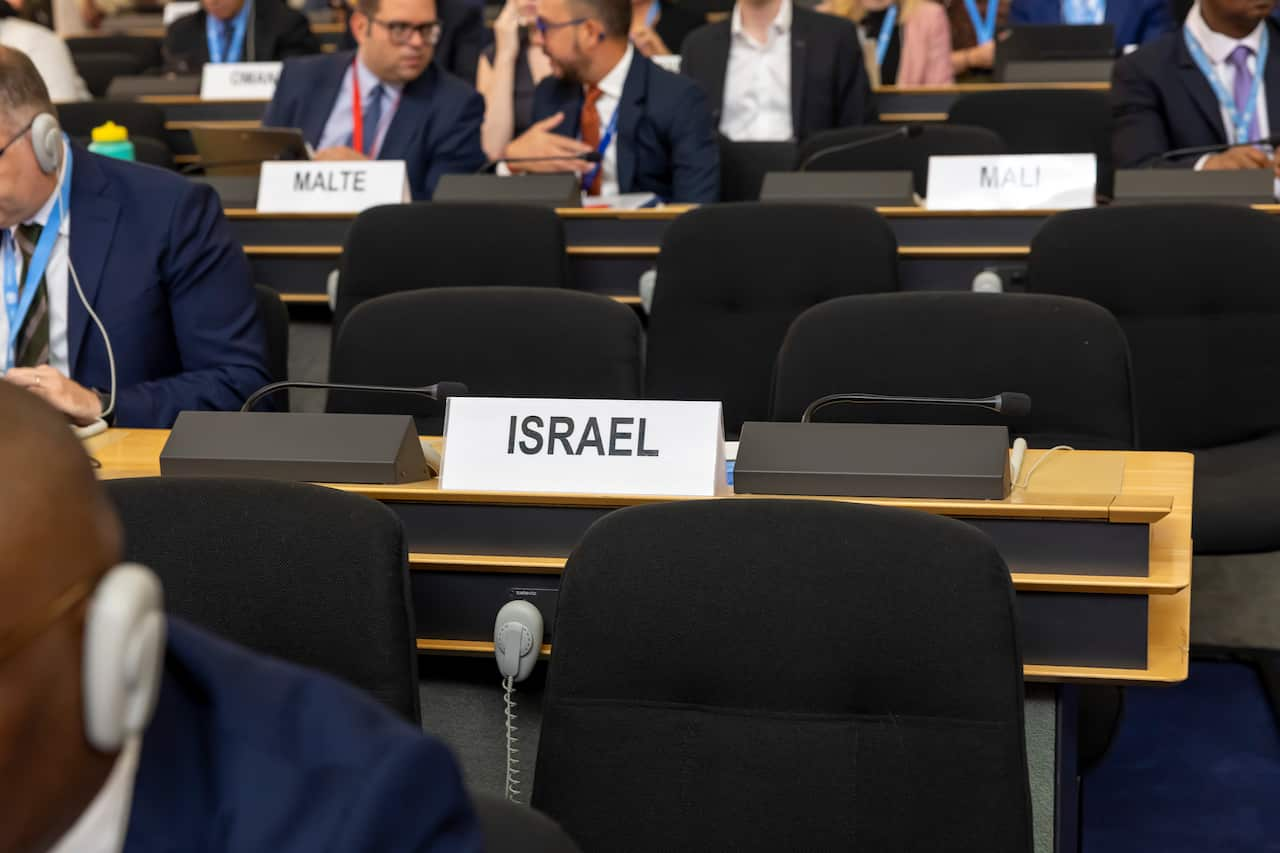Australia has a clear case to take further action against Israel in the wake of a new report saying it is committing genocide in Gaza, legal experts and human rights group say, but it remains unclear what steps the federal government might take.
Tuesday's report by the United Nations Independent International Commission of Inquiry, which does not speak on behalf of the world body and has faced harsh Israeli criticism, found that "genocide is occurring in Gaza and is continuing to occur", commission chief Navi Pillay said.
It also concluded "that statements made by Israeli authorities are direct evidence of genocidal intent", Pillay said.
Israel has repeatedly denied it is committing genocide in Gaza, and a statement from its foreign ministry said it "categorically rejects" the commission's report and labelled it "distorted and false".
The commission has urged all UN member states — which includes Australia — to not only end the genocide, but to punish those responsible for it. Experts say the recommendations provide a blueprint for the Australian government to take stronger action, including stronger sanctions, but it is unclear whether the government will take them up.

Caitlin Reiger, CEO at the Human Rights Law Centre, said it is the "strongest call so far" from the UN that Israel is committing genocide.
Genocidal intent
What sets this report apart from previous findings is the conclusion of "genocidal intent".
"For me, that's the most important thing, the finding of intent," said Dr Juliette McIntyre, senior lecturer in law at the University of South Australia.
The report found that 46 per cent of the 65,000 people killed in Gaza since 7 October 2023 were women and children. During the first 12 months of the Hamas-Israel war, life expectancy in Gaza dropped by nearly half, from 75.5 years to 40.5, it found.
Former Australian human rights commissioner Chris Sidoti, who served as commissioner of the inquiry, told reporters that the high number of dead are not "accidents".
"They are not collateral damage. They are the direct consequence of a military strategy of saturation bombing and scorched earth when it comes to the people of Gaza," Sidoti said.
Israel has previously denied accusations it is pursuing a scorched earth policy, which refers to a military strategy of destroying everything that may be useful to an enemy, such as agriculture and infrastructure, before retreating.
The finding is distinct from the International Court of Justice's (ICJ) interim finding in January 2024, which ruled there was a risk of genocide being committed, but stopped short of calling for a ceasefire.
In late August, the world's leading genocide scholars passed a resolution stating the legal criteria had been met to establish Israel was committing genocide in Gaza.
Ben Saul, challis chair of international law at the University of Sydney and UN special rapporteur on human rights and counter-terrorism, said the report from the UN commission "activates the duty on all countries to take feasible measures to prevent genocide from occurring".
Does Australia have an obligation to act?
The Commission of Inquiry called on all UN member states, such as Australia, to "prevent the commission of genocide" in Gaza.
"Australia is not a bystander," said Lara Khider, senior lawyer at the Australian Centre for International Justice.
One of the recommendations calls on member states to cease the transfer of arms and other equipment or items to Israel where there is reason to suspect their use in military operations that have involved or could involve the commission of genocide.
The Australian government says it does not export arms to Israel, but is involved in the supply chain for the F-35 fighter jets used by the Israeli Air Force. Defence Minister Richard Marles told the ABC in early August "there is no step that we can take here which has any impact in relation to the activities of Israel".
However, McIntyre says the report's obligations are clear.
"What the report is calling on us to do is to stop sending that material," she said.
Another recommendation is to take action, including sanctions, against Israel and individuals or corporations involved in facilitating genocide.
"If more and more states come together and start doing things like sanctioning Israeli officials and not sending weaponry and so on, you just increase this pressure and this isolation on Israel. It makes it harder for them to do what they want to do," McIntyre explained.
In June, Australia placed sanctions on two far-right Israeli government ministers, Itamar Ben-Gvir and Bezalel Smotrich. Saul said that there is scope for more.
"We haven't imposed sanctions on those most responsible for the conduct of the war, a prime minister, the defence minister, the war cabinet, the military commanders who are prosecuting the war. And so I think it is time for Australia to take tougher action," Saul said.
Saul also says that Australia can push for stronger action at the upcoming UN General Assembly in New York.
"Australia has obviously pledged to recognise Palestinian statehood but of course, that alone is not going to change the situation. It's not going to end starvation or famine or war crimes. So that is also got to go beyond symbolism and take concrete action to pressure Israel."
"It could also, for example, join the genocide case against Israel in the ICJ. It could contribute additional resources to the International Criminal Court. So there are lots of steps Australia could take."
What happens if we fail to meet the obligations?
While the Commission of Inquiry's report is not legally binding, McIntyre says the ICJ can prosecute a failure to prevent genocide.
"One of the only genocide cases that we ever had, which was in respect of the Srebrenica genocide, was a finding about a failure to prevent genocide. So it is something that can occur," McIntyre said.

McIntyre points to a case brought to the ICJ from Nicaragua against Germany over its military support of Israel. The case was ultimately rejected by the court, but it shows that states could be held accountable in international forums in the future.
"Of course it requires other states to have an interest in pursuing that kind of action, and at this stage the focus is on getting Israel to stop what its doing, and less on pursuing other states for their failure to prevent it," she said.
There could also be indirect consequences.
"Having contributed in some way to the commission of the genocide against the Palestinian people is, you know, shameful. And I think will have consequences for governments domestically as well. You know, they will not be voted back into office," McIntyre said.
Political response
The government is yet to indicate whether it will commit to the recommendations.
In a statement on Tuesday night, Foreign Minister Penny Wong said that it was clear long before this report that Gaza had "gone beyond the world's worst fears".
"Together with partners, we have condemned Israel's denial of aid and the killing of civilians seeking to access water and food."
Opposition foreign affairs spokesperson Michaelia Cash said that Israel has the right to defend itself from terrorism, but that it must comply with international law.
"The UN should be clear-eyed about who is responsible for prolonging the suffering — Hamas, a listed terrorist organisation that still holds Israeli hostages and continues to use civilians as human shields," Cash said.
A spokesperson for Attorney-General Michelle Rowland said the Albanese government's position was that "every effort must be made to safeguard innocent life and end the suffering and starvation of the people of Gaza".
They said the Netanyahu government must comply with the binding provisional orders made in 2024 by the International Court of Justice in South Africa's case against Israel under the Genocide Convention.
Those provisional orders demanded that Israel ensure its military did not commit acts that violated the rights of Palestinians under the Genocide Convention and take immediate steps to provide humanitarian assistance, among other requirements.
"Australia's longstanding position on questions relating to genocide is to respect the independence of international courts and tribunals and their role in upholding international law."
Israel has rejected the claim of genocide, with retired Brigadier General Amir Avivi telling ABC Radio on Wednesday morning that the UN has "completely lost its moral compass".
"You see in Gaza today every possible attempt to minimise collateral damage," Avivi said.
For the latest from SBS News, download our app and subscribe to our newsletter.

